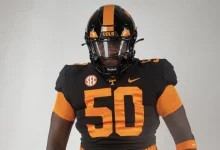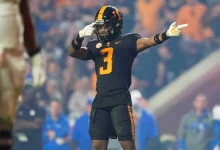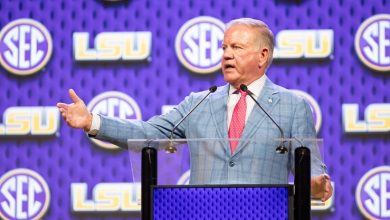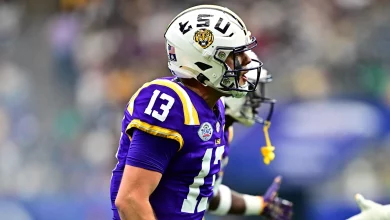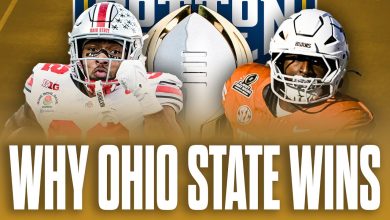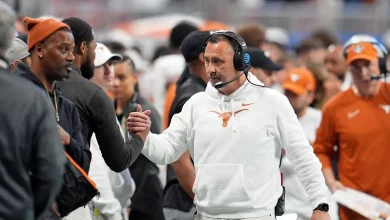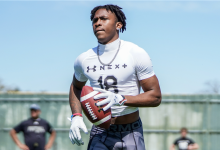Marcus Freeman has elevated Notre Dame football with strong leadership, innovative strategies, and a renewed sense of purpose.
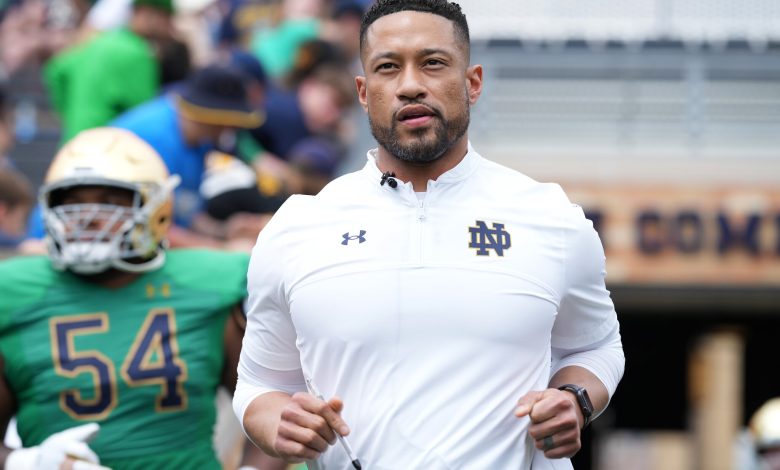
When Marcus Freeman was named the head coach of Notre Dame football in 2021, it marked the beginning of a new era for the Fighting Irish. Freeman, a young and dynamic leader with a deep understanding of the game, was tasked with continuing the legacy of one of the most storied programs in college football history. His appointment, following the unexpected departure of Brian Kelly, was met with excitement and anticipation. Freeman had already built a reputation as one of the brightest defensive minds in the game, having served as the defensive coordinator at Notre Dame before his promotion to head coach. But it was his approach to leadership, his innovative strategies, and his ability to instill a renewed sense of purpose within the program that truly set him apart and elevated Notre Dame football.
The Leadership of Marcus Freeman
One of the key factors in Freeman’s success has been his exceptional leadership. A coach’s ability to inspire and motivate his players is just as important as his tactical knowledge, and Freeman has proven to be a natural leader. From the moment he took over the program, he embraced the challenge of leading a team that had long been in the national spotlight. He was not only tasked with maintaining the high expectations that come with being the head coach at Notre Dame but also with rebuilding the trust and culture within the locker room.
Freeman’s leadership style is rooted in his authenticity, communication, and ability to connect with players. As a former player himself, Freeman understands the mindset and challenges of young athletes and knows how to communicate in ways that resonate with them. He builds strong relationships with his players, getting to know them not just as athletes but as individuals. This personal connection fosters a sense of loyalty and respect between Freeman and his team, which is crucial for creating a winning culture.
Freeman’s leadership is also characterized by his unwavering belief in discipline and accountability. He expects the highest level of commitment from his players both on and off the field, and he has worked hard to ensure that the team buys into this philosophy. Whether it’s in practice, in the weight room, or in the classroom, Freeman holds his players accountable for their actions, emphasizing that success is a result of consistent effort and attention to detail.
In addition to holding his players accountable, Freeman has been proactive in creating a culture of trust and transparency within the program. He fosters an environment where players feel comfortable expressing themselves and where open communication is encouraged. This approach not only helps strengthen the bond between coach and player but also encourages a sense of unity within the team. Freeman’s leadership is more than just about wins and losses; it’s about building a program that thrives on mutual respect and collaboration.
Innovative Strategies on the Field
While Freeman’s leadership off the field has been a defining characteristic of his tenure, his approach to the game itself has also played a significant role in elevating Notre Dame football. Known for his expertise as a defensive coordinator, Freeman has brought a fresh perspective to the team’s overall approach to the game. His innovative strategies and ability to adapt to changing circumstances have made Notre Dame football more competitive and dynamic.
One of Freeman’s core strengths as a coach is his defensive acumen. In his time as defensive coordinator, Freeman transformed Notre Dame’s defense into one of the most formidable units in college football. His emphasis on speed, physicality, and versatility has allowed Notre Dame to compete against some of the most potent offenses in the country. Freeman’s defensive schemes are built around creating chaos for opposing quarterbacks, using a mix of blitzes, zone coverages, and aggressive line play to disrupt offensive rhythm. He emphasizes flexibility, allowing his players to adjust to different offensive styles and attack points, making it difficult for opponents to predict how they’ll be attacked.
As head coach, Freeman has continued to prioritize defense while also expanding his strategic focus. His ability to mix aggressive defense with an efficient offense has created a well-rounded team that can compete with the best in college football. Under Freeman’s leadership, Notre Dame has developed a more modern, balanced approach to the game, one that doesn’t rely solely on traditional power football but also incorporates innovative play designs and strategic game management.
Offensively, Freeman has worked closely with his staff to implement a system that maximizes the talents of the players on the roster. While Notre Dame’s offense has traditionally been grounded in a strong running game, Freeman has shown an openness to incorporating more pass-heavy concepts when needed. He understands that in order to compete at the highest level, the Fighting Irish must be versatile on offense, capable of adjusting to different defensive schemes and exploiting mismatches. This commitment to a more diverse offensive playbook has been evident in Notre Dame’s improved offensive efficiency, as they’ve been able to keep pace with high-scoring teams while still maintaining a focus on physicality and ball control.
Freeman’s strategic approach is also reflected in his emphasis on player development. He has worked tirelessly to ensure that each player reaches their full potential, both individually and within the context of the team. Through careful evaluation, film study, and tailored coaching, Freeman has helped elevate the play of his players in all aspects of the game. This commitment to development has been particularly noticeable on the defensive side of the ball, where Freeman has been able to take raw talent and mold it into a cohesive unit that executes his complex schemes with precision.
A Renewed Sense of Purpose
Perhaps one of the most significant ways in which Marcus Freeman has elevated Notre Dame football is by instilling a renewed sense of purpose within the program. Notre Dame, with its rich history and tradition, has long been considered one of the elite programs in college football. However, in recent years, the team had begun to fall short of expectations in big games, and the program had struggled to break through to the next level. The Fighting Irish had developed a reputation for being a solid team but one that often fell just short of championship contention.
Freeman’s arrival brought a shift in mindset. He made it clear from day one that his goal was not just to win games but to return Notre Dame to the pinnacle of college football. He spoke frequently about the importance of the program’s storied legacy and how it motivated him to push the team to new heights. Freeman’s passion for Notre Dame and his understanding of its rich history allowed him to connect with the fans, players, and alumni in a way that reinvigorated the program.
One of Freeman’s first orders of business was to address the mental and emotional aspects of the game. He recognized that in order for Notre Dame to achieve greatness, it needed to not only be physically prepared but also mentally tough. Freeman instilled a “championship mentality” within his players, emphasizing the importance of focusing on the little details and maintaining a sense of pride in wearing the Fighting Irish uniform. He made it clear that every player on the roster was responsible for upholding the standards of the program, and he instilled a sense of accountability that permeated every aspect of the team.
Freeman’s focus on discipline, accountability, and mental toughness has helped Notre Dame regain its competitive edge. The Fighting Irish now approach every game with the belief that they belong among the elite teams in college football, and they play with a renewed sense of purpose each week. This shift in mindset has helped Notre Dame close the gap with the top teams in the country, and they are once again viewed as a legitimate contender for a national championship.
Recruiting and Player Development
Another key area where Freeman has elevated Notre Dame football is in recruiting. Recruiting has always been a vital part of Notre Dame’s success, but under Freeman, the program has taken a more modern and aggressive approach to attracting top talent. Freeman’s background as a recruiter and his ability to connect with recruits have been instrumental in bringing in a new wave of talented players to South Bend.
Freeman’s emphasis on building relationships with recruits has helped Notre Dame expand its recruiting footprint and attract players from a wider range of backgrounds and geographic regions. His ability to sell the vision of Notre Dame football, combined with the university’s academic reputation, has made the Fighting Irish a more attractive destination for elite prospects. In particular, Freeman’s success in recruiting top-tier defensive talent has helped strengthen Notre Dame’s defense, ensuring that the team remains competitive at the highest level.
Marcus Freeman’s leadership, innovative strategies, and renewed sense of purpose have played a pivotal role in elevating Notre Dame football. His approach to coaching, player development, and recruiting has helped restore the program to national prominence, and his ability to inspire and motivate his players has created a culture of excellence within the program. Under Freeman’s guidance, Notre Dame has once again become a legitimate contender for national championships, and the future of Fighting Irish football looks brighter than ever.

